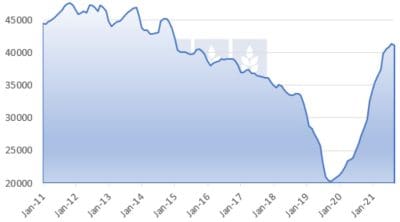Following Thanksgiving Day Thursday holiday US markets opened Friday weaker to COVID-19 new variant.
- Chicago wheat December contract down US11.25 cents per bushel to 825.5c/bu;
- Kansas wheat December contract down 8.25c/bu to 865c/bu;
- Minneapolis wheat December up 2.75c/bu to 1039.5c/bu;
- MATIF wheat December contract down €6.25/t to €299.25/t;
- Corn March contract up 6.25c/bu to 591.75c/bu;
- Soybeans January contract down 13.75c/bu to 1252.75c/bu
- Winnipeg canola January 2022 contract up C$5.50/t to $1038.90/t;
- MATIF rapeseed February 2022 contract down €13.25/t to €673.25/t;
- US dollar index was down 0.7 to 96.1;
- Dow Jones industrial average down 2.5 per cent.
- Brent crude oil futures price down 11.5 per cent.
- AUD weaker at US$0.714;
- CAD weaker at $1.275;
- EUR firmer at $1.130;
- ASX wheat January 2022 up A$3/t to $430/t;
- ASX wheat January 2023 up $1/t to $406/t.

International
Thanksgiving/new variant markets. Chicago wheat lost 11.25usc/bu, Kansas fell 8.25usc/bu while Minni was a rare green close, up 2.75usc/bu. Matif wheat fell €6.25/mt, Black Sea was quoted USD$0.75/mt and corn managed to finish up 6.25usc/bu. Soybeans were hammered, down 13.75usc.bu, meal was off USD$1.4/st and beanoil fell 1.92usc/lb. Matif canola fell €13.25/mt while Winnipeg added CAD$5.50/mt. Crude got caught up in the macro Omicron sell off, down USD$10.24/bbl – which put it as one of the biggest downs for the week. The Dow Jones was smashed 905 points.
The sell-off in macro markets left few survivors. The emergence of a new variant forced broad-brush risk off as the world tries to work out the impact. I don’t have an answer, but a component of the wider agricultural commodities rally has been built on the world getting back to normal. Biodiesel demand in Europe has been a driver of the veg oil sector, something that would be instantly affected should countries adopt a lockdown policy such as Israel which took 5 minutes before banning all foreigners. Is the world more comfortable dealing with another variant given we have done a 2-year apprenticeship? Pfizer said they could have an Omicron vaccine in 100 days.
Are we jumping at shadows? The WHO has urged the world to lighten up. Two South African health experts, including the doctor who first sounded the alarm about the variant, indicated that the symptoms linked to the coronavirus strain have been mild so far. It is early days, but initial reports show milder symptoms in younger patients. They have recorded 3220 patients although there has been no uptick in hospitalizations.
Qantas share price has fallen 16pc since the post Covid high printed late last month.
Quietly, China’s hog herd (figure 1) has all but fully recovered from the ASF drawdown. The hog population is pegged at 411.9 million head at the end of Sept, the most since 2015. This fell to close to 200 million head at the height of the ASF.
Australia
Australian markets closed last Friday yet again stronger. Wheat cash bids were firmer on all grades by $3-5/mt. Barley bids were stronger on the grower boards and barley trade markets moved upwards to 10/mt stronger for the day. Canola bids to growers at prices posted were a fraction softer on the cash boards while NSW domestic crush bids were stronger by $5/mt.
Headers got back going on Sunday across parts of NSW with reports of growers getting back onto canola through southern NSW. Quality is now a concern in shot and sprung canola.
With a clear run for most of the country over the next few days should see growers keen and eager to get stuck in and get as much off as they can.
Logistical issues in NSW will be a headache this week. Flood waters still are lying around, roads are cut off and there are issues of getting trucks in and out of paddocks. This may continue to put pressure on the short term domestic and export market for nearby slots.
Source: Lachstock Consulting


HAVE YOUR SAY